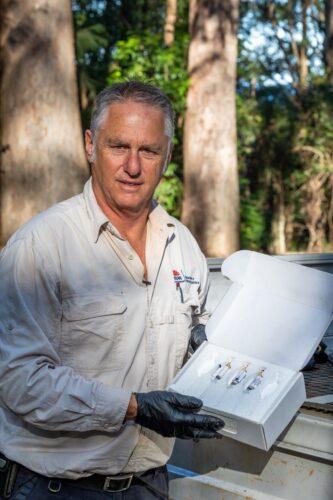Dr Paul Meek
Senior Research Scientist, Vertebrate Pest Research Unit.
See Dr Meek’s full research profile here.
E: paul.meek@dpi.nsw.gov.au
Research outputs linked to policy change and decision-making.
- 2018-present: Western Tracks and Better Predator Control Projects. Dr Meek is leading the research component of two community-led, collaborative invasive animal management projects, Western Tracks based near Wanaaring, NSW, but with linkages in Queensland, and Better Predator Control in the Northern Tablelands of NSW. One paper on Queensland data has resulted and data analysis for other publications on movements is underway. Both these projects are aimed at wider adoption of best-practice strategies and methods by affected stakeholders. Adoption of better decision-making processes is facilitated through stakeholder involvement and participation in the management of invasive predators and feral pigs and associated monitoring and evaluation.
- 2012-2023: Centre for Invasive Species Solutions Portfolio. Paul and his colleagues Peter Fleming and Guy Ballard have conducted over 10 years of research to improve the welfare of predators trapped during vertebrate pest trapping programs. Their methods have been adopted nationally in wildlife management textbooks, Standard Operating Procedures and State legislation, and have led to new toxin use and enhanced animal welfare outcomes for pest predators. Their research on aerial baiting for predators has led to the State-wide adoption of an increased baiting rate for predators that is now accepted as best practice.
- 1995-98: Christmas Island Red Crab Migration Plan. The unique migration of the red crab on Christmas Island is recognised as one of the world’s most amazing wildlife migrations. The pathways of each crab are historically mapped by their ancestral pathways, that now means red crabs have to travel through residential areas and main roads to access the beach, and then return to their burrows. Mortality is extremely high, and the first Red Crab Migration Policy written by Paul has become a long-standing conservation driven plan to minimise road-based mortality during the migration season.
- 1992-1998: Best practice predator trapping. While undertaking his research at Jervis Bay (below), Dr Meek instigated testing of less harmful leghold traps for predators and published the results in a technical note. Subsequently, while in Christmas Island, he partook in a national review led by Dr Fleming, that resulted in policy changes associated with the 1990s review of NSW Prevention of Cruelty to Animals Act 1979 regulations and led to a journal publication. This work has been continued in the Centre for Invasive Species Solutions Predator Management Portfolio and Western Tracks and Better Predator Control Projects (above).
- 1989-95: Jervis Bay Territory. Paul’s research in Booderee National Park (then Jervis Bay Nature Reserve) and surrounding Wreck Bay Aboriginal Community, HMAS Creswell and Beecroft Peninsula, produced the first Companion Animal Management Plan for Jervis Bay Territory, aimed at implementing better pet ownership practices to minimise wildlife predation by dogs and cats. He also wrote the first Vertebrate Pest Management Plan for Booderee based on his studies of foxes, cats and dogs in Jervis Bay. This founding plan formed the basis of the recent 20 years of pest management and reintroduction attempts in Booderee NP.
Current academic employment and positions
- 2021: Affiliate Scientist, University of Sydney.
- 2014: Senior Research Scientist, Department Primary Industries/Vertebrate Pest Research Unit.
- 2012: Senior Research Fellow, University of Queensland.
- 2005: Adjunct Lecturer and Honorary Associate, University of New England.
Highest qualification
- 2016: PhD Applied science and ecology, University of New England.
Major prizes, medals, honours
- 2016: Chancellors Doctoral Research Award – University of New England.
- 2015: Golden Birkenstock Award for Excellent Contributions to Pest Research – IACRC.
- 2011: Churchill Fellowship – Winston Churchill Memorial Trust, Australia.
- 1987: Most Practical Student – Adelaide University, Roseworthy Campus.
Roles on government or regional organisational committees
- NSW Vertebrate Pest Management Symposium: Paul has been the champion and lead-organiser of this bi-annual practitioner-meets-scientist symposium since 2016. This forum aims to bring practitioners in pest animal management together with scientists and policy makers to provide an opportunity to share knowledge, findings and develop new ventures to instigate improvements and change in vertebrate pest management.
- Australasian Vertebrate Pest Conference 2024: Paul is a member of the Technical Committee for the 19th conference in 2024. His role is to contribute to the preparation of a program of themes, selection of plenary speakers and selection of oral and poster papers.
- WildObs: This group has been formed by Queensland University to establish the first camera trap observatory in Australia that aims to guide the use of camera trapping as a wildlife survey and management tool into the future.
